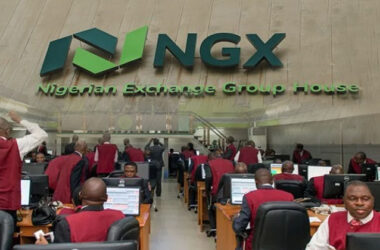Nigeria, Africa’s largest economy, has long been recognized for its vast potential and resources. However, to fully harness this potential and drive sustainable economic growth, experts are increasingly emphasizing the need for strategic measures to support and enhance the country’s Gross Domestic Product (GDP).
In fact, Data by the National Bureau of Statistics (NBS) showed that Nigeria’s financial service sector contributed N3. 8 trillion to Nigeria’s Gross Domestic Product (GDP) in 2023, an increase of 26.5% from N3. 01 trillion in 2022.
Its worthy of north that, economic growth is measured by an increase in gross domestic product (GDP), which is defined as the combined value of all goods and services produced within a country in a year. Many forces contribute to economic growth. However, there is no single factor that consistently spurs the perfect or ideal amount of growth needed for an economy. Unfortunately, recessions are a fact of life and can be caused by external factors such as geopolitical and geofinancial events.
For instance, in the United States, economic growth often is driven by consumer spending and business investment. If consumers are buying homes, for example, home builders, contractors, and construction workers will experience economic growth. Businesses also drive the economy when they hire workers, raise wages, and invest in growing their businesses. A company that buys a new manufacturing plant or invests in new technologies creates jobs and spending, which leads to growth in the economy.
Other factors help promote consumer and business spending and prosperity. Banks, for example, lend money to companies and consumers. As businesses have access to credit, they might finance a new production facility, buy a new fleet of trucks, or start a new product line or service. The spending and business investments, in turn, have positive effects on the companies involved. However, the growth also extends to those doing business with the companies, including in the above example, the bank employees and the truck manufacturer.
Analysts are of the view that, Tax cuts and tax rebates are designed to put more money back into the pockets of consumers. Ideally, these consumers spend a portion of that money at various businesses, which increases the businesses’ revenues, cash flows, and profits. Having more cash means companies have the resources to procure capital, improve technology, grow, and expand. All of these actions increase productivity, which grows the economy. Tax cuts and rebates, proponents argue, allow consumers to stimulate the economy themselves by imbuing it with more money.
For these Analysts, deregulation is the relaxing of rules and regulations imposed on an industry or business. It became a centerpiece of economics in the United States under the Reagan administration in the 1980s, when the federal government deregulated several industries, most notably financial institutions. Many economists credit Reagan’s deregulation with the robust economic growth that characterized the U.S. during most of the 1980s and 1990s.
Proponents of deregulation argue tight regulations constrain businesses and prevent them from growing and operating to their full capabilities. This, in turn, slows production and hiring, which inhibits GDP growth. However, economists who favor regulations blame deregulation and a lack of government oversight for the numerous economic bubbles that expanded and subsequently burst during the 1990s and early 2000 in the United States.
Speaking exclusively to Business Times, an Economist, Oluwafemi said, “historically reliant on oil exports, Nigeria’s economy has been vulnerable to fluctuations in global oil prices, he advocates for investing in other sectors such as agriculture, technology, manufacturing, and services to reduce dependence on oil and create a more resilient economic structure noting that, by fostering growth in these areas, Nigeria can enhance its GDP and create more stable employment opportunities.”
According to him, “upgrading transportation networks, improving energy infrastructure, and expanding digital connectivity are essential for stimulating economic activity, explaining that, well-developed infrastructure not only facilitates trade and investment but also enhances the efficiency of businesses and attracts foreign direct investment.” He argued that targeted investment in infrastructure projects can yield significant long-term benefits for Nigeria’s GDP growth.
“Small and Medium Enterprises (SMEs) play a crucial role in economic development, contributing significantly to GDP and employment. Implementing policies that support the growth of SMEs, including access to finance, streamlined regulatory processes, and business development programs. By empowering SMEs, Nigeria can stimulate entrepreneurial activity and drive economic growth from the grassroots level.” He noted
Also speaking to Business Times on this issue, a Brands Management Consultant, Maxwell Bafyau, stressed that, “investing in human capital is vital for sustained economic growth, pointing out that, the importance of improving education and skills development to build a capable and adaptable workforce should be the nation’s top priority because by aligning educational programs with market needs and providing opportunities for continuous learning, Nigeria can enhance productivity and innovation, which in turn supports GDP growth.”
According to him, “effective governance and robust policy frameworks are essential for creating a conducive environment for economic growth, adding that, advocate for transparent and efficient economic policies that address issues such as corruption, regulatory inefficiencies, and fiscal discipline. Strengthening governance structures can build investor confidence and create a more predictable and stable economic environment, supporting GDP growth.”
“In the digital age, innovation and technology play a pivotal role in economic development. Nigeria should focus on fostering a culture of innovation and embracing technology to drive economic growth. Investment in research and development, support for tech startups, and the adoption of digital solutions across various sectors can enhance productivity and competitiveness, contributing to GDP growth.” He noted.
As Nigeria seeks to bolster its economic performance and drive sustainable GDP growth, the insights and recommendations from experts provide a valuable roadmap. By diversifying the economy, investing in infrastructure, supporting SMEs, enhancing human capital, strengthening governance, and fostering innovation, Nigeria can unlock its full economic potential and achieve sustained growth. The collaborative efforts of policymakers, businesses, and stakeholders will be crucial in implementing these strategies and ensuring a prosperous economic future for the nation.









